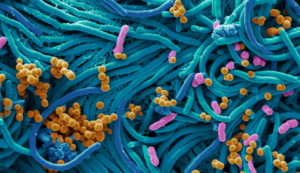All about bacteria & how it spreads
From inside your digestive system to your business spaces, bacteria can be found everywhere. Let’s take a look at what bacteria are, how they are spread, and the ways you can help keep bad bacteria at bay with the help of Dettol® Pro Solutions.
So, what are bacteria?
Bacteria are a type of germ. They are tiny living cells which are not visible to the naked eye and thrive in a variety of different environments. Bacteria can be found almost anywhere from inside the human body, to surfaces in the home and substances such as water or food.1
What is the difference between bacteria and viruses?
A virus is another type of germ, however unlike bacteria viruses cannot survive unless they have a living host such as the human body or an animal. Another difference between bacteria and viruses is that most viruses do cause illness. Some of the most common viral infections include the cold and flu viruses.2
Are bacteria bad for you?
There are particular types of bacteria which can be harmful to you and your family. If you consume or come into contact with these harmful bacteria, it can make you unwell. Harmful bacteria are usually called pathogenic bacteria because they cause disease and illnesses like strep throat, staph infections and food poisoning.3
Although some types of bacteria can make you very unwell, there are lots of other types of bacteria, such as those found in yogurts and inside your digestive system, which are not harmful. In fact, many bacteria are actually good for you and have lots of benefits such as aiding digestion and keeping you healthy inside and out.4

How do bad bacteria spread?
Bacteria can be spread in a number of ways including:
- Person-to-person contact e.g. shaking hands
- Through feces
- If someone is unwell they could spread bacteria through the tiny of droplets of fluid which are released when they cough or sneeze
- Consuming food which is infected with harmful bacteria
- Certain bacteria can survive on household items and surfaces for a number of hours – touching these surfaces will help bacteria to spread
Bacteria in your business spaces
Bacteria are invisible to the naked eye, so it’s easy to forget that there are plenty of places in your business where bacteria might be lurking.
Of course, not all of these bacteria will be harmful, but some common bacteria could make your customers and staff ill.
These include:
- Staphylococcus aureus, or staph, especiallyMethicillin Resistant Staphylococcus aureus or MRSA
- Salmonella
- Escherichia coli, or E. coli6
Given the right nutrients and environment, certain bacteria can divide and multiply every 20 minutes, which explains why symptoms of illnesses often show up quickly after you have come into contact with harmful bacteria.5 With the right cleaning and disinfecting products, regular cleaning can make a difference in helping protect customers and staff from illness-causing bacteria, such as the ones listed above.
What does antibacterial mean?
Simply put, antibacterial means anything that destroys bacteria or inhibits the ability of bacterial growth and reproduction.6
How can your business benefit from antibacterial products?
When you’re short on time, a quick spruce and surface wipe down might seem like a job well done. But those areas in your business which are prone to harbouring bacteria require a more thorough clean to ensure harmful bacteria don’t have the chance to thrive. That’s where antibacterial cleaning products come in.
Cleaning products with antibacterial properties help to destroy and inhibit bacterial growth, providing extra protection for your community. When used as directed, Dettol® antibacterial cleaning products can kill up to 99.9% of bacteria found on the surfaces.*
*When used as directed



